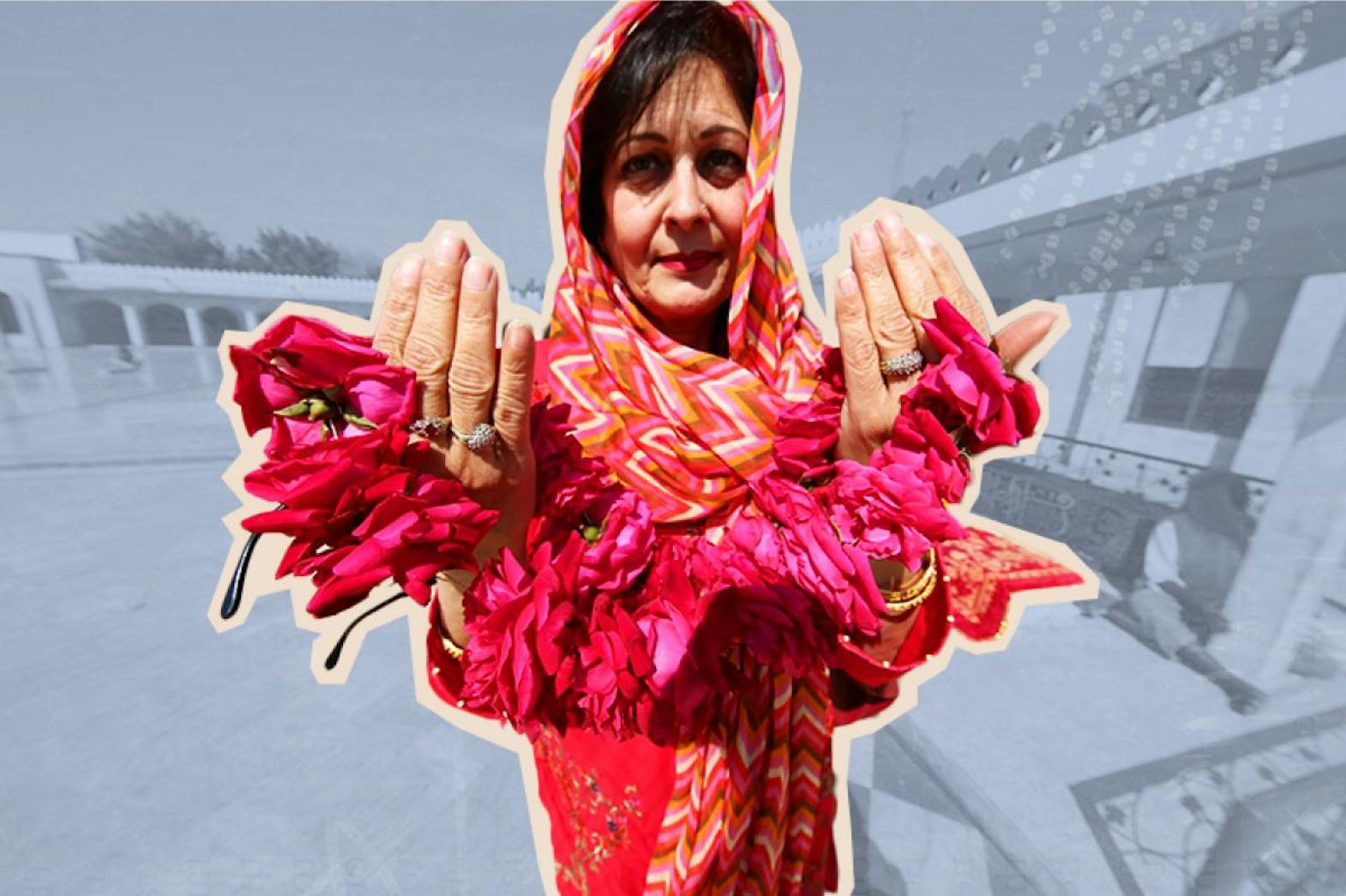It’s International Women's Day! Woohoo!
Turns out, while we’ve made a lot of progress globally in gaining representation at the top tiers in organizations, we still have a long way to go. In a report called Women in the Workplace 2022, only 1 in 4 top executive leaders is a woman, and only 1 in 20 is a woman of colour. If I’m being honest, I’m surprised women of colour are sitting at 1 in 20 (yay for us, and yeah, a lot more to do here).
I grew up in a very traditional Punjabi/Kashmiri household. We ate on the floor on a dastarkhan with our hands. Utensils were limited to serving dishes and very much a foreign concept. In fact, spoons only came in our lives when I was much older, and Mama insisted that she had just learnt how to make chicken corn soup on Khaana Khazaana, and it required the use of a spoon.
When I was nine, one day, my dad came home with a box of pizza, a fork and knife. Now, Baba was a student of faaren (foreign) people. The CEO at the company he worked at was American (let’s call him John), and his supervisor was German (let’s call him Hank). Baba would go on and on with everything about John and Hank. How they spoke, how they shook hands, how they made eye contact with people they spoke to, how they smiled a lot, how they did not scowl, how they did not use their hands to emote, how they sat, how they walked. How they were kind and polite (he had not met Canadians back then). And taught Baba phrases that were common where they came from. How they rarely talked about their parents and instead talked about their dogs. And on and on.
After we ate dinner on the dastarkhan that night, Baba had me sit on my desk chair (which I used only for homework, but apparently, pizza required a table). He showed us how John and Hank ate their food with a fork and a knife and asked me to follow.
Honestly, I thought it was the most inefficient and sad, disconnected way to honour your food.
Me: Baba jaani, I can eat this with my hands.
Baba: Nai Putter (No, son), this is how John and Hank eat.
Me: Why do I need to eat like John and Hank? How do their children eat?
Baba: Because you may need to live in their world after the war. It will be John and Hank who decide who works with them. You can’t be too different, Putter. Learn their world. Look at what they do, why they do it, how they do it. And then do it better. Be the wadda (big) boss. Thrive in their world. Make us proud.
Me: Ji Baba jaani, can I finish this with my hands, though?
Baba: Na. Kaanta Chhurri istama’al kar (Nope. Use the fork and knife).
Now, that story is absolutely loaded with messages. Every time I think of it, it ignites a new lesson. Lessons about surviving as the 'Other' in someone else’s world. Lessons about keen observation. About self awareness. About pressure to make them ancestors proud (feel it, love it, keeps me up at night, too). And yeah, there are some sad internalized elements of assimilation I wish my dad didn’t try to pass on, given our colonial past in Pakistan, but hey, they’re part of the messaging.
And finally, the message of a knife and a fork. Use the fork to hold. Use the knife to portion. And no, don’t need to use ‘em all the time.

Today, I reflect on the story to remind myself of surviving and thriving, of leaning on allies, of learning from the Johns and Hanks of the world, on never forgetting who taught us, what in life taught us, and to creating spaces to build more spaces where we all feel empowered together, and passing on what we learnt along the way.
How do we go about building spaces where women feel welcome, empowered, and energized? Here’s my two (okay, maybe 10) cents on the topic – an assembly of things we’ve done at Narratives Inc. and things I’ve picked up along the way from life, from people who have supported me on my journey to be where I am.
Spoiler alert – none of this is rocket science.
Here goes:
1. Celebrate who you are. This lesson comes straight from my Ma’ji (my mother). As a woman of colour who is a founder of a successful company, I don’t shy away from saying so (believe me, I cringe a little every time I do so and worry about the humility police (i.e., my ancestors) slapping me on the wrist, but it's important. If you’re going up in the ranks, talk about it share your journey. You never know who you may inspire along the way. Young women need to see themselves reflected in success stories. Did you recently get promoted? Do a guest talk at a school. Reach out to an old professor. Tell them you’d love to come talk about what you did with your degree. Inspire them, kids! You know how many times I’ve taken photos with lovely little brown kids who think I’m a superhero? I’m not, but they’re still a decade away from knowing the truth about me, but hey, at least them kiddos are fired up to be a ‘woman boss’ in their formative years. Mission accomplished.
2. Keep it real. When sharing success stories as women, don’t just talk about the rainbows and unicorns, and definitely don’t just talk about the doom and gloom. Keep the narrative real. What barriers did you face? How did you get past them? Where did you find the courage? Was it courage from within? How did you survive? How did you go from surviving to thriving? Who were your allies? Did you ever fall? Did it hurt? How did you get up? Share! Tell me. Inspire me.
3. Hold each other up. Take the time to support, uphold, promote the accomplishments of all women in your circle. Inside and outside the organization. Let them tell you what their accomplishments are. Sitting on a Board, getting a diploma, learning a new skill, climbing the Kilimanjaro, becoming the first ever National Chief in Canada, seeding earth-shattering conversations in our Canadian landscape, providing care for their elderly parents, crushing the fundraising goal for a cause important to them, or successfully navigating a paw patrol-themed birthday party with 20 four-year-olds. Create a culture where people share what means, feels, and is worthy of celebration to them. Heck, I know I’ll want a standing ovation after hosting my parents at my place in Winnipeg for a whole month this summer (honestly, I think it's only two weeks, but see what I mean?!). Jokes aside, there’s so much to celebrate. Women are doing amazing things every. Single. Day. Find them, promote them. Ally with them.
4. Promote allies. Take the time to express gratitude to allies. It takes courage for anyone to go against status quo. It takes courage to share power, to share the front line, to share the spotlight. If you were standing with a gold medal and all of a sudden it turns out the medal needs to be shared with 20 others, wouldn’t you scowl? Maybe you’d agree because you’re an awesome person, but you’d wonder for sure. Did they all work as hard? Did they all deserve it? Is it the right thing to do? When people walk against the tide, appreciate it and express the appreciation. It’ll help keep the momentum going. It will also encourage you to be an ally to others. Promote progressive behaviour. For every shoddy behaviour you call out, make sure you’re amplifying when things are done right.
5. Promote support for all parents. Show support for all parents – dads and mums alike. At Narratives, every employee returning from maternity or paternity leave receives a welcome back bonus as well as a child-care stipend. Every employee has access to the same wellness supports. Everyone has access to a soundproof Wellness room – great for noisily pumping breastmilk without feeling weird about it, screaming into a pillow, meditating, taking a nap, or bawling on a virtual therapy session.
6. Normalize conversations about childcare and family care. Ask dads how sleepless their nights are with a newborn, just like you’d ask a mother. Ask your male employees how care for their elderly parents is going as opposed to just asking your female employees. Check your own bias.
7. Normalize Bereavement Time. Take the time to support your employees through loss of a loved one. And please don’t assume your definition of a family is the employee’s definition of a family. And yeah, some of you are probably freaking out about people abusing this, but there’s this lovely thing about karma – it finds a way. You’ll be okay.
8. Build a trauma-informed workplace – Take the time to build cultural, emotional, psychological safety in everything you do. Trauma-informed workplaces promote a deeper level of respect of who we are as humans, our backgrounds, our stories, and how we express ourselves in the world. A trauma-informed workplace will have a better shot at promoting constructive dialogue and an inclusive environment.
9. Learn, talk, and grow together – We all count. As painful as it is, and as tiring as it is, take the time to help educate and grow together. People enter our lives from all sorts of backgrounds. Some decades behind when it comes to gender equity. Normalize conversations about gender equity in a culture that supports learning safely. Hold them knives. Use them only when needed. Trust me when I say that it exhausts me every time someone treats me a certain way just because I’m a woman, but I also know that in the ocean of pushing for change, it is my drops of patience and gentle nudges that have also contributed to who we are, how we carry ourselves, and how we forge ahead.
10. Don’t take it for granted – This is probably the single most important one for me. Don’t be entitled. Take the time to learn about those who have fought tough battles and, yes, blood, sweat and tears for you to have the freedoms you do. Remember those who are still fighting for acceptance. Intersectionality matters. Every human life matters. Don’t take it for granted, and don’t let the legacy end with you. Pass it on. We owe it to the generations to come.
I leave you all with this final message:
To never forgetting. To never taking our freedoms for granted. To standing in power and humility. To holding each other up. To honouring women and allies before us. To honouring women and allies with us who forge the path so we may run, so we may fly.
To dads, brothers, sons, and others.
To knowing why, how, and when to use the knives and forks. To building our circle far and wide and rich in laughter and strength.
To all my ancestors. To all the women who have raised me. Taught me.
To all them AWESOME women who I get to work with each day at Narratives Inc. and to all our allies. To all my allies.
To holding space for our sisters, daughters, granddaughters, and great granddaughters so they can honour the space in our memory…. happy International Women’s Day.




